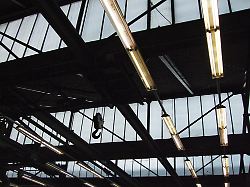EU derogation expires
Mercury fluorescent tubes are banned
08/24/2023, 09:55 am
For a long time, mercury-containing fluorescent lamps were allowed to be sold over the counter in the EU. That’s over now. However, there are exceptions.
In the EU, an exemption for the sale of mercury-containing fluorescent tubes expires this Thursday. According to the EU Commission, lamps of the T5 and T8 type may only be sold over the counter in the future if they come from stocks that have already been produced. The only exceptions are lamps for special purposes, for example in the military sector.
“Suitable alternatives are now available for T5 and T8 tubes, which can lead both to energy savings and to dispensing with the placing on the market of fluorescent lamps containing mercury,” said a spokeswoman for the EU Commission. That is why it was decided to let the exemption for these products expire. However, use is still allowed.
According to the German Lighting Association, fluorescent tubes are still used today in a number of companies and public facilities, but also in street lighting, garages and cellars. Users now have to think about alternatives as they won’t be able to get replacement bulbs any time soon.
Lamp producers well prepared
“Anyone who has not yet dealt with the topic of renovation should do so soon,” said association manager Jürgen Waldorf. He also pointed out that operating costs could be saved and refurbishment costs could be amortized by replacing the lamps due to the high efficiency of the new LED technology. In addition, needs-based refurbishment reduces overall energy consumption and, with good planning, also increases visual comfort.
According to the Fachverband Licht, the lamp manufacturers are well prepared for the ban. You have therefore prepared yourself at an early stage to exit production in Germany. At the same time, new LED lights and so-called retrofit lamps were developed. This is what lamps are called that can be used in old lights without the need for complex structural changes to the light itself.
When operating on electromagnetic ballasts, only the starter usually has to be replaced with a replacement element supplied by the lamp manufacturer. The reason for the planned ban of fluorescent lamps from the EU, in addition to the comparatively high energy consumption, is in particular the dangers of the mercury they contain. “Mercury is a chemical element with neurotoxic effects that poses a high risk to the environment and health,” the spokeswoman said.
